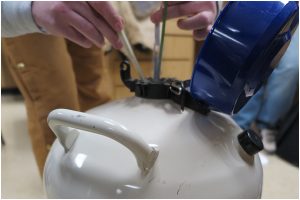24 Feb DSU students experience hands-on AI training
 Eleven Dickinson State University (DSU) students enrolled in ANSC 264 – Artificial Insemination (AI) Training had the opportunity to learn the skill from professionals during a three-day training Feb. 10-12, 2021. While this training typically occurs once or twice a year at Stockmen’s Livestock in Dickinson, this session was moved inside the DSU Ag Building because of low temperatures. The class was co-instructed by Dr. Doug King, professor of agriculture at DSU, and Mr. Donald Nordby, a fulltime rancher and sales representative for ABS Global.
Eleven Dickinson State University (DSU) students enrolled in ANSC 264 – Artificial Insemination (AI) Training had the opportunity to learn the skill from professionals during a three-day training Feb. 10-12, 2021. While this training typically occurs once or twice a year at Stockmen’s Livestock in Dickinson, this session was moved inside the DSU Ag Building because of low temperatures. The class was co-instructed by Dr. Doug King, professor of agriculture at DSU, and Mr. Donald Nordby, a fulltime rancher and sales representative for ABS Global.
The students learned in the classroom during the morning hours and participated in hands-on instruction each afternoon. They were joined by a number of producers with an interest in learning the skill to take back to their personal ranches. Not only do the students and producers learn together, they also have the opportunity to make connections with each other to benefit their future careers in agriculture.
The instruction is incredibly valuable to the students enrolled as there aren’t many opportunities to learn the skill elsewhere. “A lot of the other stud companies aren’t doing schools as much as they used to,” said Nordby. “It’s just amazing – we had people from Texas and Missouri calling, trying to get into the school up here. There’s been less emphasis on training. I think it’s important for producers to go through an AI school because it’s more than just breeding a cow. There’s management considerations, understanding how synchronization works, and we’ll go through nutrition, how you handle cattle in terms of getting them to go where you want them to go… I always tell producers, ‘Even if you don’t AI, you should go to an AI school because it’ll make you a better manager.’”
Jacob Jessen, a freshman working toward a bachelor’s degree in agricultural studies with the option of integrated ranch management, took a moment to share his thoughts on the training. In his perspective, there is much to learn, and there is no better way to do it. “Learning how to sync [the cows] and when they are going into heat, knowing the days and knowing the hours between each time you have to sync them, so all your cows are on the same page when you get to the date of your AI… Learning the hormone shots that you need to give them in that time period and all the things you need to use, and then the actual AI part and how to load semen guns… You’re actually going out to the cow and learning the anatomy of a cow. It’s kind of a cool process. What’s most important is knowing how to administer and not being careless. These guys preach that quite a bit and teach us how not to develop those bad habits… It’s such a great time to get the opportunity to learn this.”
While Jessen’s family doesn’t artificially inseminate cattle on their ranch, he has helped others complete the task near his hometown of Grass Range in Central Montana. “It’s a small town with a lot of local ranches where you know a lot of people, so you always get asked all the time. A young kid like me, people see that as an opportunity!”
Nordby believes lifelong learning is at the core of what makes a good rancher. “I’m a firm believer in ‘You never stop learning.’ If you’ve ranched for 20 or 30 years, there’s always something you can learn to make you more efficient. Cows are all different, and the book can say, ‘On average, this is what a cow will do,’ but there’s always cattle or herds of cattle that will prove it wrong… When you deal with Mother Nature and cattle, learning your environment and how cows coexist and how you can make it profitable, it’s not cut and dry. You have to know what your resources are and live within your means.”


